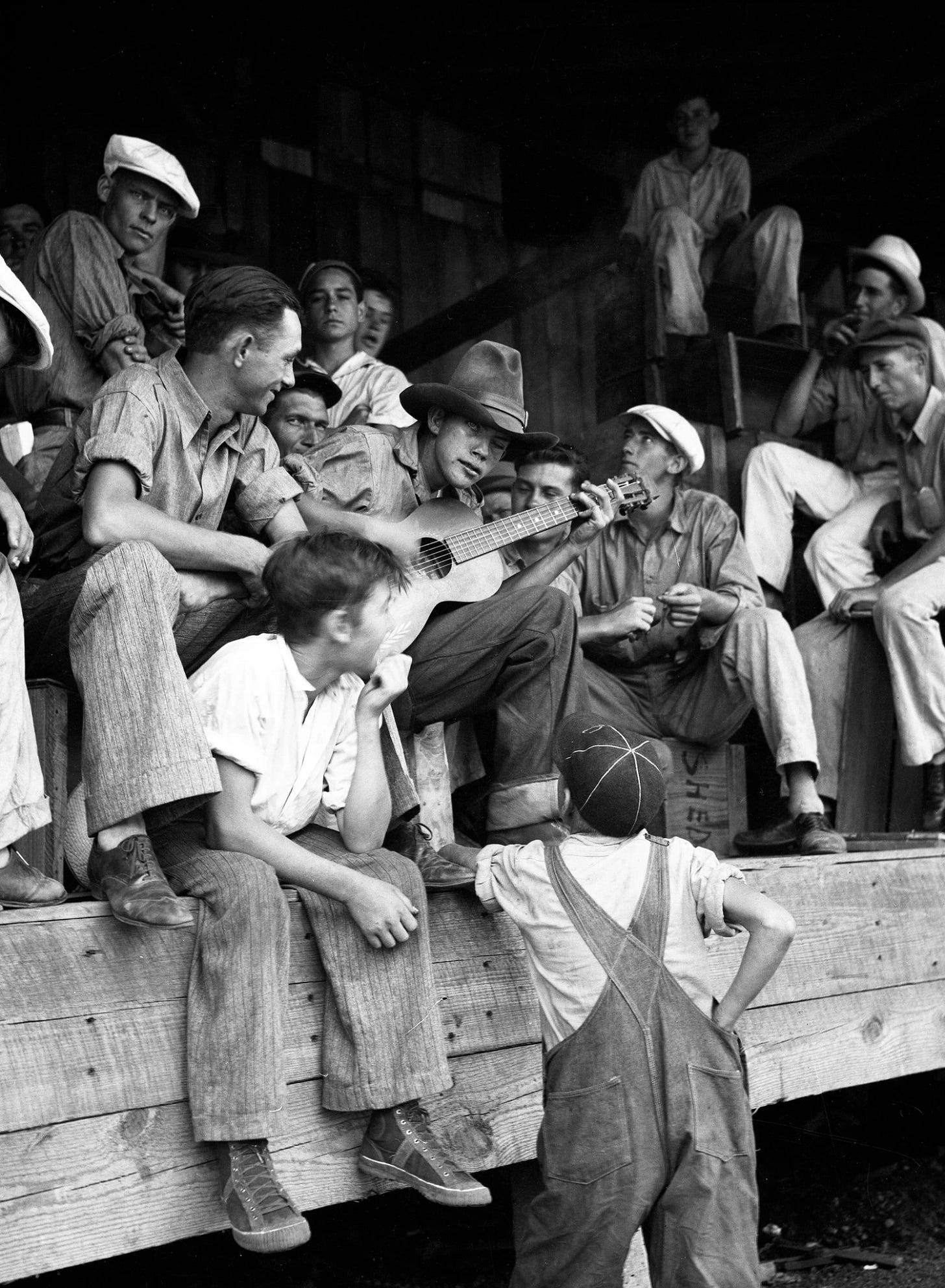Readers! I’d like to share your favorite phone photos for my New Year’s Day newsletter so please send me your favorite with a short caption. Just respond to this message and I will get it.
Tomato-packers’ recess, Copiah County, Miss. 1936.Credit...Eudora Welty/Eudora Welty LLC, courtesy of Mississippi Department of Archives and History
That eye!
I haven’t read much Eudora Welty but I had one of those electric moments with her work when I hunkered down with her photography book in the the library, avoiding a big rain storm.
Here are two pieces on her photography. One in Smithsonian, one in NYT.
“In 1934, she applied to study at the New School for Social Research in New York City with photographer Berenice Abbott, who was documenting landmarks disappearing in the city's rush toward modernity. Welty's application was turned down.”
“In her memoir, One Writer's Beginnings, published in 1984, Welty paid respects to picture-taking by noting: "I learned in the doing how ready I had to be. Life doesn't hold still. A good snapshot stopped a moment from running away. Photography taught me that to be able to capture transience, by being ready to click the shutter at the crucial moment, was the greatest need I had. Making pictures of people in all sorts of situations, I learned that every feeling waits upon its gesture; and I had to be prepared to recognize this moment when I saw it."
She added: "These were things a story writer needed to know. And I felt the need to hold transient life in words—there's so much more of life that only words can convey— strongly enough to last me as long as I lived.""
She might have quit photography but she wrote an introduction to one of my favorite photo books.
“In landscapes, cityscapes, street scenes, roadside scenes, at every sort of public converging-point, in dreaming long view and arresting close-up, through hours of dark and light, he sets forth what makes up our ordinary world. What is there, however strange, can be accepted without question; familiarity will be what overwhelms us.”
—Eudora Welty, from the introduction to William Eggleston’s 1989 book of photographs, “The Democratic Forest”
Club float, Black State Fair parade, Jackson, Miss. 1930s.Credit...Eudora Welty/Eudora Welty LLC, courtesy of Mississippi Department of Archives and History
I’ve read enough of Welty’s fiction to think there must be some connection to how she attempted to depict the often ugly and racist relationship her white characters had with black people and her photographs of black citizens in Mississippi.
My writer friend John has a wonderful new newsletter. Subscribe!
Last week he wrote about distortion and I was struck by his inclusion of Eudora Welty (I had already been planning this post). I hope he doesn’t mind my quoting what he says, here. I like this clear explanation of indirect discourse, something I had always heard but never understood 100%. (I am a writer without an MFA so my “craft talk” has been cadged by eavesdropping those who have MFAs and or teach writing.)
“Voice in third person usually takes the form of so-called indirect discourse, a technique by which the narrator takes on the cadence and syntax of a character whose consciousness it inhabits. The critic James Woods calls this technique the “free indirect style”:”
So-called omniscience is almost impossible. As soon as someone tells a story about a character, narrative seems to want to bend itself around that character, wants to merge with that character, to take on his or her way of thinking and speaking. A novelist's omniscience soon enough becomes a kind of secret sharing.
But we most commonly associate voice with the first person, a mode of storytelling that, in its ideal form, gives the illusion of forthrightness—hello, it’s me, the person this happened to, telling you straight!—while employing distortion to tell a different, less immediately obvious tale. We might not be remotely interested in the events recounted in Eudora Welty’s “Why I Live at the P.O.”—the details of a trivial family conflict—if they weren’t being processed through the mind of its eccentric, headstrong narrator:
Papa-Daddy woke up with this horrible yell and right there without moving an inch he tried to turn Uncle Rondo against me. I heard every word he said. Oh, he told Uncle Rondo I didn't learn to read till I was eight years old and he didn't see how in the world I ever got the mail put up at the P.O., much less read it all, and he said if Uncle Rondo could only fathom the lengths he had gone to to get me that job! And he said on the other hand he thought Stella-Rondo had a brilliant mind and deserved credit for getting out of town. All the time he was just lying there swinging as pretty as you please and looping out his beard, and poor Uncle Rondo was pleading with him to slow down the hammock, it was making him as dizzy as a witch to watch it. But that's what Papa-Daddy likes about a hammock. So Uncle Rondo was too dizzy to get turned against me for the time being. He's Mama's only brother and is a good case of a one-track mind. Ask anybody. A certified pharmacist.
Until next time…
Adalena
I love to receive comments and questions about photography and cameras!
My email: adalenakavanagh@gmail.com
Instagram: @mamiyaroid (instant/film) @5redpandas (personal)
Twitter: @adalenakavanagh
Also, if you’re thinking of buying Polaroid film for the first time, here is my referral code, which gets you 10% off, and I get some reward points.
Original photography prints: adalenakavanagh.bigcartel.com (I change out the shop every month of so. If you see something you like, let me know, I’m happy to make you a print.)
Disclosure: I am an affiliate of Bookshop.org and I will earn a commission if you click through and make a purchase.
-Adalena Kavanagh





